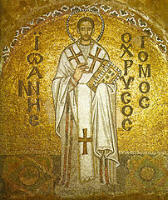
Life Of John Chrysostom by Frederic M. Perthes
I
NAME AND TIME
THE man of whom this book will treat received from his parents the name John. Grateful Christians called him Chrysostom, or “Gold-mouth,” because of the many golden words which he addressed to them. He has also been called a “saint.” To him who knows, that, in the full sense of the word, we have had but one Holy person on earth, this appellation certainly seems strange and unsuitable; but if we do not take the word in so exact a sense, if we designate by it a man of truly Christian mind and walk, we can apply it to John; for it will appear from the following history of his life, labors, and sufferings, that he was an eminently pious, Christian man.
Yet before we commence our narrative, it is necessary to describe briefly the time in which he lived. More than fifteen hundred years have passed since he labored among Christians; for he was born in the year 347 after Christ. The first three centuries, it is known, were a period of trial for the Christian church; the heathen in the great Roman Empire soon perceived, and with ever growing clearness, what a power had arisen in the church of Christ against them, against their faith, their tastes, their life. They saw that Christianity and Paganism could not permanently exist together, that if the new religion continued, the old must cease; hence they began the warfare against that new power and maintained it for three centuries. Much blood flowed; many, many a pious Christian fell a martyr.
These calamitous times were passed when John was born. About twenty years before his birth, Constantine the Great, sovereign of the Roman Empire, united himself to the Christian church, and thenceforth persecution ceased to rage, and the church of the Lord was now before the eyes of men firmly established upon earth. There were heathen, to be sure, everywhere, in the cities and in the villages, and they were by no means friendly to the Christians; temples and altars were yet standing, and their false gods were yet served; but everywhere in the Roman Empire stood also Christian houses of worship; everywhere lived Christian communities, and now, protected by the Emperor, they could in peace and quiet perform their Divine service. In the city where Chrysostom was born, one hundred thousand inhabitants were connected with the church of Christ.
Thus far may this be called a fortunate time; but if we observe it more closely, we shall be unable to ēsteem it such on the whole. The prediction of the Lord in Matt. 13:25, 26, had already been fulfilled; the tares had begun to spring up among the wheat. When there was no longer any danger involved in confessing Christ, some, without proper impulse of heart, suffered themselves to be baptized; when the Emperor, occupying the highest place upon earth, had adopted Christianity, and to do this brought honor and gain, thousands of the high and the low followed him, though the heart was unmoved. The church was filled with people who were Christians but in name; the worldliness and sin which had hitherto stood without the church, and in hostility against it, became now a power in the church itself. We shall learn from the history of John, that bad Christians were everywhere, and not merely in the palaces of the great; that wicked priests stood in the pulpit and ministered at the altar.
Besides this, Christians had not remained united in their faith, or in their statements of doctrine, but had fallen into strife. We will not attempt here to decide whether they contended about fundamental principles only, or also about secondary matters, and as if the salvation of the soul depended on them; but this we must say, that the manner and the spirit which characterized their strife, were very human, passionate, and selfish. Many by this contention lost the essence of faith, the spirit of Christianity, piety of soul. Believers, in the region where John lived, grew continually more and more corrupt; so that when Mohammed, the false prophet, appeared two hundred years later, and sought to spread his religion, by fire and sword, the Christians no more, as formerly, welcomed the martyr’s crown, but forsook Christ, for whom they had no genuine love, and united themselves to Mohammed. In those very regions where Chrysostom once labored, where the first and most devout churches flourished, has Christianity disappeared, because the tares were suffered to enter; and now for many centuries the people have worshipped the God of the Turks.
At the time when that evil had begun to press with power into the church of Christ, lived Chrysostom, and suffered, because he strove, without fear or reserve, to withstand the advancing stream. We will now speak of him.
Copyright ©1999-2023 Wildfire Fellowship, Inc all rights reserved

 Keep Site Running
Keep Site Running